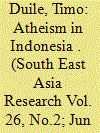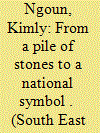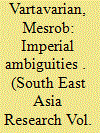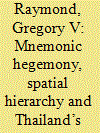|
|
|
Sort Order |
|
|
|
Items / Page
|
|
|
|
|
|
|
| Srl | Item |
| 1 |
ID:
159801


|
|
|
|
|
| Summary/Abstract |
The phenomenon of atheism has often been neglected in academic research on Indonesia, a Muslim majority country in which every citizen is supposed to have a religious affiliation. In addressing that oversight, this article first outlines the state-driven discourses and practices in Indonesia concerning atheism before exploring the alterative discourses and social practices found within Indonesian atheist communities. Based on a long-term engagement with online atheist communities and four months of fieldwork in Jakarta, I suggest that hegemonic discourses and state practices on the one hand, and discourses and social practices within the atheist community on the other hand, sharply contradict each other. Whereas the state and large parts of society still consider atheism a threat since it is understood to connote communism, it is typically leftist atheists rather than their right-wing or liberal counterparts who not only acknowledge religion but are even eager to engage with progressive religious movements. The reasons for this, the article argues, lie in alternative narratives of Indonesia’s past and in the atheists’ engagement with global discourses. Finally, the article provides an example of a progressive religious community in which leftist atheists are involved, revealing a social practice that successfully ruptures state-driven discourses.
|
|
|
|
|
|
|
|
|
|
|
|
|
|
|
|
| 2 |
ID:
159803


|
|
|
|
|
| Summary/Abstract |
Existing studies of the Cambodia-Thailand conflict over the Khmer temple of Preah Vihear tend to regard the temple as nationally significant to both countries. However, little is known about how the border temple complex has emerged from obscurity to symbolize the nation in Cambodian nationalist discourse. Therefore, this article seeks to examine the stakeholders, contexts, and specific political situations implicated in the emergence of the ancient temple as a site of national significance. It links the temple’s rise to national prominence in Cambodia to the broader context of Prince Norodom Sihanouk’s politics of postcolonial nation-building. I argue that Sihanouk had a strong stake in the temple and the conflict over it with Thailand. His investment in the project of nationalism in relation to the temple was an important resource in pursuing his wider political objectives in building the post-independence Cambodian nation.
|
|
|
|
|
|
|
|
|
|
|
|
|
|
|
|
| 3 |
ID:
159799


|
|
|
|
|
| Summary/Abstract |
This article examines relations between American imperial personnel and indigenous Muslims in the southern Philippines from the colonial advent to the post-colonial present. American officials initially established imperial linkages with Muslims that bypassed emerging political arrangements in core Christian areas. In ruling different Filipinos disparately, Christian and non-Christian zones of the archipelago assumed separate developmental trajectories. Muslims were racialized and forcibly modernized, but stood apart as a peripheral minority. Although sub-national imperial connections were severed after 1913, Muslims retained a memory of a distinct relationship with the United States that benefited local interests and contained government violence when the Americans returned to fight a war on terror at the beginning of the 21st century.
|
|
|
|
|
|
|
|
|
|
|
|
|
|
|
|
| 4 |
ID:
159800


|
|
|
|
|
| Summary/Abstract |
Indonesia in the post-New Order era saw frequent incidents of religious violence. These began with bloody sectarian conflicts in the cities of Ambon and Poso, which pitted Muslims against Christians. During the era of President Susilo Bambang Yudhoyono (2004–2014), heresy campaigns against non-mainstream faiths (Ahmadiyah and Shi’a) increased, followed by attacks mainly levelled at properties belonging to members of these minority communities. Scholars have argued that Yudhoyono and his predecessors, Abdurrahman Wahid and Megawati Soekarnoputri, should be held responsible for this frequent violence. However, while the presidents’ ideological outlooks or personalities may have been contributing factors, this article will focus rather on the institutional factors that hindered their responses to the violence. At times, the presidents encouraged initiatives to promote the rights of minorities. However, these programmes faced constraints from other state institutions due to the bureaucracy and judiciary’s inclination to preserve majoritarian social order and the hegemonic interpretation of the Belief in One God article in the state’s foundational philosophical theory (Pancasila). These challenges were further compounded by a decline in presidential power in the post-New Order era. This article argues that, so long as these constraints exist, any Indonesian president will have difficulties overcoming violence against minority communities.
|
|
|
|
|
|
|
|
|
|
|
|
|
|
|
|
| 5 |
ID:
159802


|
|
|
|
|
| Summary/Abstract |
Commemoration of the Second World War in Southeast Asia varies significantly, from countries that have chosen to use the memory of Japanese occupation as a means of strengthening national unity, to those that pay little attention because doing so would distract from their own independence struggle. Thailand is one of those countries that downplays its official memory of the Second World War. This article investigates why, given that the Second World War saw significant loss of life and damage to Thai sovereignty, as well as acts of heroism, it occupies a marginal position in Thailand’s public memory. While Second World War history is not suppressed in history textbooks, Thailand’s Second World War monuments and commemorative ceremonies are either dispersed or disguised. To explain why this is the case, I examine firstly sensitivity to foreign perceptions, and secondly domestic politics in the aftermath of the Second World War. I argue that domestic politics offers a more convincing explanation, particularly with regard to the relatively obscure place of the Seri Thai resistance movement. Using the concept of mnemonic hegemony, and through analysis of the spatial distribution of Second World War monuments, I argue that Thailand’s Second World War history remains challenging and uncomfortable for Thailand’s dominant institutions, the monarchy and the military.
|
|
|
|
|
|
|
|
|
|
|
|
|
|
|
|
| 6 |
ID:
159798


|
|
|
|
|
| Summary/Abstract |
Studies undertaken on female homicide offenders are limited in both number and breadth, particularly within South East Asia. This article has consequently chosen to explore Cambodian women’s narratives of their journeys to prison for homicide offending using a feminist pathway approach. Results show a number of common threads in the women’s stories: childhood instability, economic marginalisation, criminalisation occurring within the milieu of a relationship with a man and limited access to justice and/or ability to benefit from corrupted criminal justice practices. Additionally, six distinct pathways were identified from the narratives: 1) domestic violence pathway, 2) pathway of marital abandonment, 3) traumatic life history pathway, 4) deviant women pathway, 5) pathway of male association, 6) pathway of feminine familial sacrifice.
|
|
|
|
|
|
|
|
|
|
|
|
|
|
|
|
|
|
|
|
|